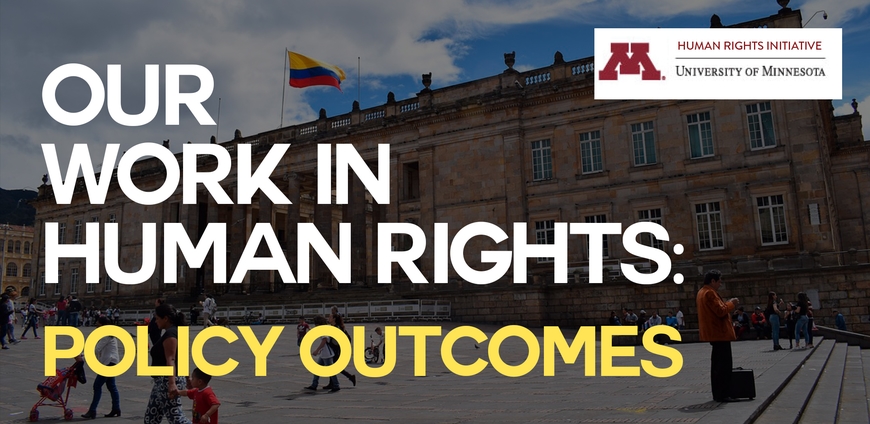Our Work in Human Rights: Policy Outcomes
The Human Rights Initiative (HRI) supports interdisciplinary human rights-based research by providing direct funding to University of Minnesota faculty engaged in this work. The effort, which is a collaboration between the College of Liberal Arts (CLA) and the Humphrey School of Public Affairs (HHH), seeks to strengthen the human rights practice and profession by championing groundbreaking engaged research. This 5-part series will showcase a handful of the accomplishments of these projects.
One of the most impactful results of human rights work can be directly affecting government policy on the issue which you are researching. It is inspiring when academic research can lead to a fundamental change in the way governments behave and treat their citizens. Through comprehensive advocacy and lobbying campaigns at the national and international levels, several of our HRI projects have achieved just that.
An prime example of an HRI project that achieved significant policy outcomes is Greta Friedemann-Sanchez’s (Public Affairs) project “Family Commissioners: Fostering Justice, Security, and Peace in Colombian Families in the Post-Conflict Era.” This research team pointed to the limited capacity and resources of frontline respondents called “family commissioners,” who are charged with supporting victims of domestic violence, as a main obstacle to realizing the legislation’s full implementation.
Working in partnership with the Minneapolis-based NGO The Advocates for Human Rights, a shadow report was submitted to the UN Human Rights Council based on this team’s work. The report recommended that the scope of family commissioner work be narrowed so that they can better focus on responding to the victims of intimate partner violence. The team also suggested that family commissioners be represented at the federal level to facilitate more streamlined communication between local and national officials.
In addition, Faculty Lead Dr. Greta Friedemann-Sánchez leveraged two reviews at the United Nations --the Human Rights Commission’s Universal Periodic Review (UPR) in 2018 and the Convention on the Elimination of All forms of Discrimination against Women (CEDAW) review in 2019 -- to bring attention to the gaps in legal redress for women in Colombia. At both reviews, Friedemann-Sánchez testified, and the team submitted the written shadow reports, outcomes of thriving collaborations with various NGO partners. At the CEDAW meeting, the Committee reviewed Colombia’s situation as it relates to gender equity and assessed its compliance with CEDAW. The Committee ultimately decided to incorporate recommendations provided by Dr. Friedemann-Sánchez’s project directly into the report that the Committee submitted to Colombia’s government.
Due to this successful advocacy with CEDAW, the Colombian government began drafting amendments to the laws addressing domestic violence, providing further opportunities for advocacy with public officials directly involved in the legal changes inspired by the study’s evidence.
To learn more about the Human Rights Initiative and its results, visit this page and tune in for the next installment of this series.
This article was written with information provided by Dr. Greta Friedemann-Sánchez, and quotes a previous write-up on her project by Haley Drozdowski.




